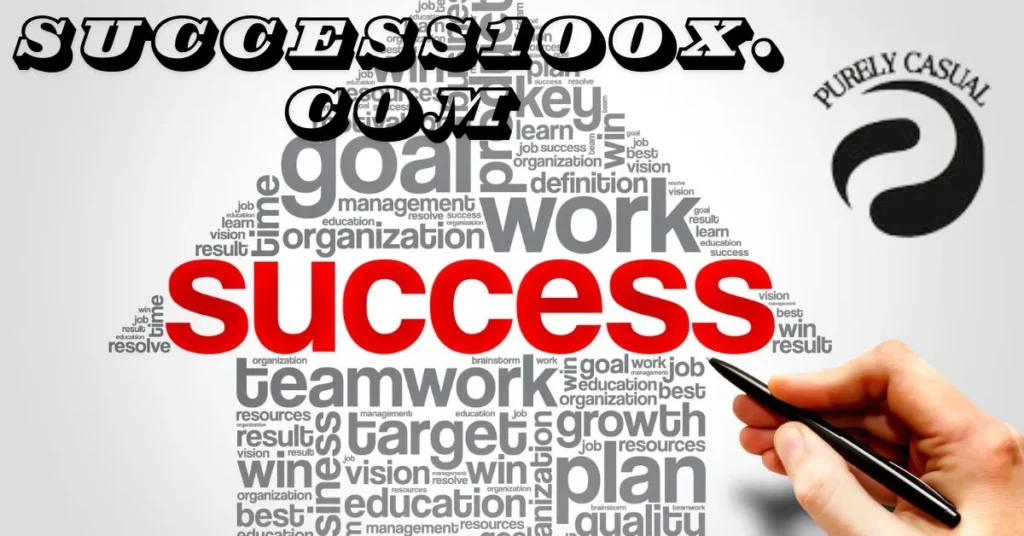success100x com factors are not just about luck or talent; it’s about knowing the right factors that drive growth. Whether you aim for business success or personal achievements, understanding these key factors can make all the difference. This guide will explore the essential elements to help you achieve 100x growth in your business and life.
Many people struggle with finding the right path to success. They may feel overwhelmed by the amount of information out there. This guide breaks down the most essential elements so you can focus on what truly matters.
A significant factor in achieving success is having the right mindset. A growth mindset allows you to learn from failures and keep moving forward. It’s about believing in your ability to improve and overcome challenges.
Setting clear goals is another crucial step. Without a plan, it’s easy to get lost or lose motivation. This guide will show you how to set SMART goals and create a roadmap for your success.
Skills and knowledge are also necessary. Continuous learning keeps you competitive in a fast-paced world. We’ll cover essential skills like time management, financial literacy, and strategic planning.
Networking and building solid relationships can open doors you never knew existed. Connecting with the right people can provide guidance, support, and new opportunities. We’ll discuss building a strong network and finding mentors who can help you reach your goals.
Consistency and execution are key. It’s not enough to have a plan; you must take action. We’ll explore ways to stay disciplined, maintain your routine, and track your progress.
Lastly, we’ll look at the role of innovation, creativity, and well-being in achieving success. Staying healthy and managing stress are just as important as any business strategy. By the end of this guide, you’ll clearly understand what it takes to achieve 100x growth in your business and life.
Let’s dive in and explore the factors that can transform your journey to success.
Here’s a table summarizing the key aspects and facts discussed in the guide on achieving 100x growth in both business and life:
| Aspect | Facts & Key Points |
|---|---|
| Mindset and Attitude | – Growth mindset fosters learning, resilience, and adaptability. – Resilience helps bounce back from setbacks. – Self-belief drives confidence. |
| Goal Setting and Planning | – SMART goals (Specific, Measurable, Achievable, Relevant, Time-bound) provide a clear framework for success. – Vision and mission guide long-term goals. |
| Skills and Knowledge | – Continuous learning keeps you competitive. – Master time management through prioritization techniques like Eisenhower Matrix and Pomodoro Technique. |
| Financial Literacy | – Understanding budgeting, investment, and financial forecasting is key to long-term success in personal and business growth. |
| Networking and Relationships | – Building a strong network provides support and opens new opportunities. – Mentorship and coaching offer valuable guidance and insight. |
| Execution and Consistency | – Discipline and routine are essential for execution. – Taking action is more important than perfectionism. |
| Innovation and Creativity | – Creative thinking leads to innovative solutions. – Embracing change and staying open to new ideas keeps you competitive. |
| Health and Well-being | – Physical health boosts energy and performance. – Managing stress through mindfulness and relaxation techniques is crucial for mental well-being. |
| Work-Life Balance | – Achieving balance between work and personal life prevents burnout and enhances overall fulfillment. |
| Success Factors | – Growth mindset, SMART goals, continuous learning, networking, and consistent execution form the foundation for success. |
This table covers all essential elements for growth, providing a quick reference to the factors that drive personal and business success.
Table Of Contents
Mindset and Attitude
Growth Mindset vs. Fixed Mindset
A growth mindset is the belief that abilities and intelligence can be developed through effort, learning, and perseverance. People with a growth mindset see challenges as opportunities to learn and grow. In contrast, a fixed mindset makes people believe their abilities are static and unchangeable, often leading to avoiding challenges and fearing failure.
A growth mindset is a critical factor of success in business and life. It allows you to embrace challenges, learn from criticism, and persist despite setbacks. Successful individuals like entrepreneurs and leaders often credit their growth mindset for their achievements.
Resilience and Adaptability
Resilience is the ability to bounce back from setbacks, failures, and difficulties. It is about staying strong and pushing forward, even when things get tough. On the other hand, adaptability is the willingness to change your approach when needed.
In today’s fast-paced world, both resilience and adaptability are crucial. They help you navigate changes and turn challenges into opportunities. Building resilience can involve mindfulness, stress management, and a positive outlook.
Self-Belief and Confidence
Self-belief is the confidence in your abilities to achieve your goals. It drives you to take risks, pursue ambitious targets, and push through obstacles. Confidence allows you to step out of your comfort zone and seize opportunities.
However, many people struggle with self-doubt and imposter syndrome. Overcoming these challenges involves acknowledging your achievements and setting small, attainable goals that build confidence over time. A strong belief in yourself is essential for long-term success and growth.
Goal Setting and Planning
SMART Goals and Beyond
SMART goals are Specific, Measurable, Achievable, Relevant, and Time-bound. They help you set clear and realistic targets, making it easier to track progress. By breaking down big goals into smaller, actionable steps, SMART goals keep you focused and motivated.
While SMART goals are practical, sometimes you need to aim higher. Stretch goals push you beyond your comfort zone and encourage you to think big. They can lead to more extraordinary achievements and drive significant progress.
Vision and Mission Clarity
Having a clear vision is like having a roadmap for your success. A vision statement defines what you want to achieve in the long term. It is a guiding light, helping you stay focused on your ultimate goals.
A mission statement explains why you do what you do. It keeps you aligned with your values and purpose, especially during challenging times. Both vision and mission clarity are crucial for staying motivated and making decisions that support your goals.
Strategic Planning and Execution
Strategic planning is about creating a detailed plan to reach your goals. It involves setting priorities, allocating resources, and determining the best actions. A good strategy considers both short-term actions and long-term objectives.
Execution is turning your plan into action. Without execution, even the best plans will fail. Successful execution requires discipline, consistency, and adapting when things are unplanned.
Skills and Knowledge
Continuous Learning and Skill Development
Continuous learning is essential in a competitive world. It involves constantly updating your skills and knowledge to stay relevant. Whether through online courses, books, or mentorship, learning helps you adapt to new challenges and seize opportunities.
Identifying the right skills to develop is critical. Focus on skills that will impact your success, like leadership, communication, and financial literacy. Staying curious and open to new ideas will keep you ahead of the curve.
Mastering Time Management
Time management is about making the most of your time. Effective time management allows you to focus on high-impact activities that drive success. Techniques like the Eisenhower Matrix or Pomodoro Technique can help you prioritize tasks and stay productive.
Avoiding procrastination is a big part of managing your time well. Breaking tasks into smaller steps can make them feel less overwhelming. Staying organized and setting clear deadlines will help you maintain momentum and achieve your goals.
Financial Literacy and Management
Financial literacy is a critical factor in achieving business success. It involves understanding how to manage money, create budgets, and make intelligent investments. Financial management helps you control costs, increase profits, and plan for future growth.
Basic financial skills, like budgeting and forecasting, are essential for personal and business success. Knowing your numbers allows you to make informed decisions and avoid costly mistakes. Building financial literacy can lead you to long-term stability and success.
Networking and Relationships
Building a Strong Network
Networking is about connecting with people who can help you grow. A strong network opens doors to new opportunities, ideas, and resources. It’s not just about meeting people but also about building meaningful relationships.
Effective networking involves giving value, not just taking. Attend events, join professional groups, and connect online through platforms like LinkedIn. The more you invest in your network, the more it will support your journey to success.
Mentorship and Coaching
Mentors and coaches can provide guidance, support, and insight that can accelerate your growth. A good mentor can help you navigate challenges and avoid common pitfalls. They offer a different perspective and can inspire you to achieve more.
Finding the right mentor involves looking for someone whose experience aligns with your goals. It’s essential to be open, coachable, and willing to learn. A productive mentorship can be decisive in achieving your business and personal goals.
Collaboration and Team Building
Success is rarely achieved alone. Building a high-performance team is crucial for reaching big goals. Collaboration allows you to leverage the strengths of others and create synergy.
A good team is made up of people with diverse skills and perspectives. Fostering a culture of collaboration and open communication helps everyone work towards common goals. A robust and supportive team can significantly boost your chances of success.
Execution and Consistency
The Role of Discipline and Routine
Discipline is vital to turning plans into action. It helps you stay focused and stick to your commitments, even when it’s hard. A well-structured routine makes it easier to maintain consistency and get things done.
Consistency is about showing up and doing the work regularly. Small, consistent actions add up to significant results over time. Developing habits that support your goals can make staying disciplined much easier.
Taking Action and Avoiding Perfectionism
Taking action is the most critical step in achieving success. Many people get stuck waiting for the perfect moment or outcome. Perfectionism can paralyze you, leading to missed opportunities and wasted time.
It’s essential to start with what you have and improve. Learning by doing is often more effective than endless planning. Accepting that mistakes are part of the process can help you confidently move forward.
Measuring Progress and Pivoting
Regularly measuring your progress keeps you on track. It allows you to see what’s working and what isn’t so you can make necessary adjustments. Tracking key metrics helps you stay focused on your goals.
Sometimes, success requires you to pivot and change direction. Being flexible and willing to adapt is essential for long-term growth. Knowing when to pivot can save time and resources align youed with your ultimate vision.
Innovation and Creativity
Encouraging Creative Thinking
Creative thinking helps solve problems and find new opportunities. It involves looking at challenges from different angles and developing innovative solutions. Encouraging creativity in yourself and your team can lead to breakthroughs and improvements.
Techniques like brainstorming and mind mapping can boost creativity. Create an environment that supports and values new ideas. Embracing a mindset of curiosity and experimentation helps drive innovation.
Embracing Change and Innovation
Change is inevitable, and embracing it can be a significant factor in success. Innovation keeps you competitive and relevant in a fast-changing world. Being open to new ideas and methods allows you to adapt and grow.
Create a culture that supports experimentation and rewards innovative thinking. Stay updated with industry trends and technology advancements. Companies that thrive are often those that embrace change and continuously innovate.
Health and Well-being
Physical Health: Energy and Performance
Physical health directly impacts your performance and energy levels. Regular exercise, a balanced diet, and adequate sleep are crucial for maintaining high energy. Taking care of your body helps you stay focused and perform at your best.
Good physical health also reduces stress and improves overall well-being. Incorporating healthy habits into your daily routine can enhance your productivity and effectiveness. Remember, taking care of your body is an investment in your success.
Mental Health and Stress Management
Mental health is just as important as physical health for achieving success. Managing stress effectively is critical to maintaining a positive mindset and preventing burnout. Techniques such as mindfulness, relaxation exercises, and seeking support can help manage stress.
Finding a balance between work and relaxation is essential for mental well-being. Regular breaks and hobbies can provide relief from work pressures. Taking care of your mental health ensures you remain resilient and motivated.
Work-Life Balance
Achieving a work-life balance means finding a healthy equilibrium between work and personal life. Setting boundaries and making time for family and personal interests are essential for long-term satisfaction. A balanced life can prevent burnout and keep you motivated.
Prioritize activities that contribute to your overall happiness and well-being. Effective time management and delegation can help create space for both work and leisure. Striving for balance enhances both professional success and personal fulfilment.
Conclusion
In this guide, we explored the key factors that drive significant growth, including adopting the right mindset, setting clear goals, and engaging in continuous learning. We also highlighted the importance of networking, effective execution, and maintaining well-being. To move forward, begin by setting your own SMART goals and cultivating a growth mindset, then apply the strategies discussed to create a solid plan for success. Success is a journey that encompasses both personal and professional growth. Focusing on these essential elements allows you to make substantial progress and achieve your goals. Remember, success is within your reach with the right mindset and actions.
FAQs
What are the critical factors for achieving 100x growth?
The critical factors for achieving 100x growth include:
- Having a growth mindset.
- Setting SMART goals.
- Continuous learning.
- Effective time management.
- Financial literacy.
- Building strong networks.
- Maintaining good health.
These factors contribute to creating a solid foundation for significant progress and success.
How can a growth mindset impact success?
A growth mindset impacts success by encouraging resilience, adaptability, and continuous learning. It helps you view challenges as opportunities for growth, learn from failures, and persist despite setbacks. This mindset fosters a positive attitude towards learning and overcoming obstacles.
What is the importance of setting SMART goals?
SMART goals are essential because they provide a clear, actionable framework for achieving objectives. They are Specific, Measurable, Achievable, Relevant, and Time-bound, which helps in tracking progress, staying focused, and maintaining motivation. Setting SMART goals also ensures a clear plan for reaching your targets.
How can I improve my time management skills?
To improve your time management skills, use techniques like the Eisenhower Matrix or Pomodoro Technique to prioritize tasks and stay productive. Avoid procrastination by breaking tasks into smaller steps and setting clear deadlines. Staying organized and creating a daily routine can also enhance your time management.
Why is financial literacy crucial for success?
Financial literacy is crucial because it helps you manage money effectively, create budgets, and make informed investment decisions. Understanding financial principles allows you to control costs, increase profits, and plan for future growth. Good financial management is essential for both personal and business success.
How do I build a strong network?
Building a solid network involves connecting with people who can support and guide you. Attend networking events, join professional groups, and engage on platforms like LinkedIn. Focus on creating meaningful relationships by offering value and staying engaged with your contacts.
What role does physical health play in achieving success?
Physical health plays a significant role in achieving success by influencing your energy levels and overall performance. Regular exercise, a balanced diet, and adequate sleep help you stay focused and productive. Good physical health also reduces stress and improves your overall well-being.
How can I manage stress effectively?
Effective stress management involves techniques like mindfulness, relaxation exercises, and seeking support when needed. Balancing work with relaxation and engaging in hobbies can help alleviate stress. Regular breaks and maintaining a positive mindset also contribute to better stress management.
What is the significance of work-life balance?
Work-life balance is significant because it helps prevent burnout and promotes overall satisfaction. Finding a healthy equilibrium between work and personal life ensures you have time for family, hobbies, and relaxation. Achieving work-life balance enhances both professional success and personal fulfilment.







